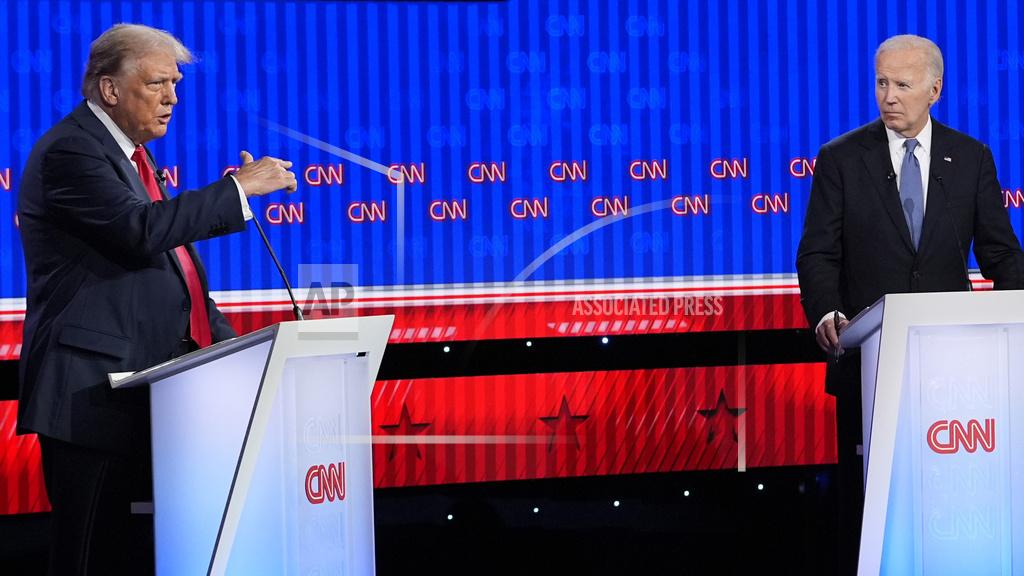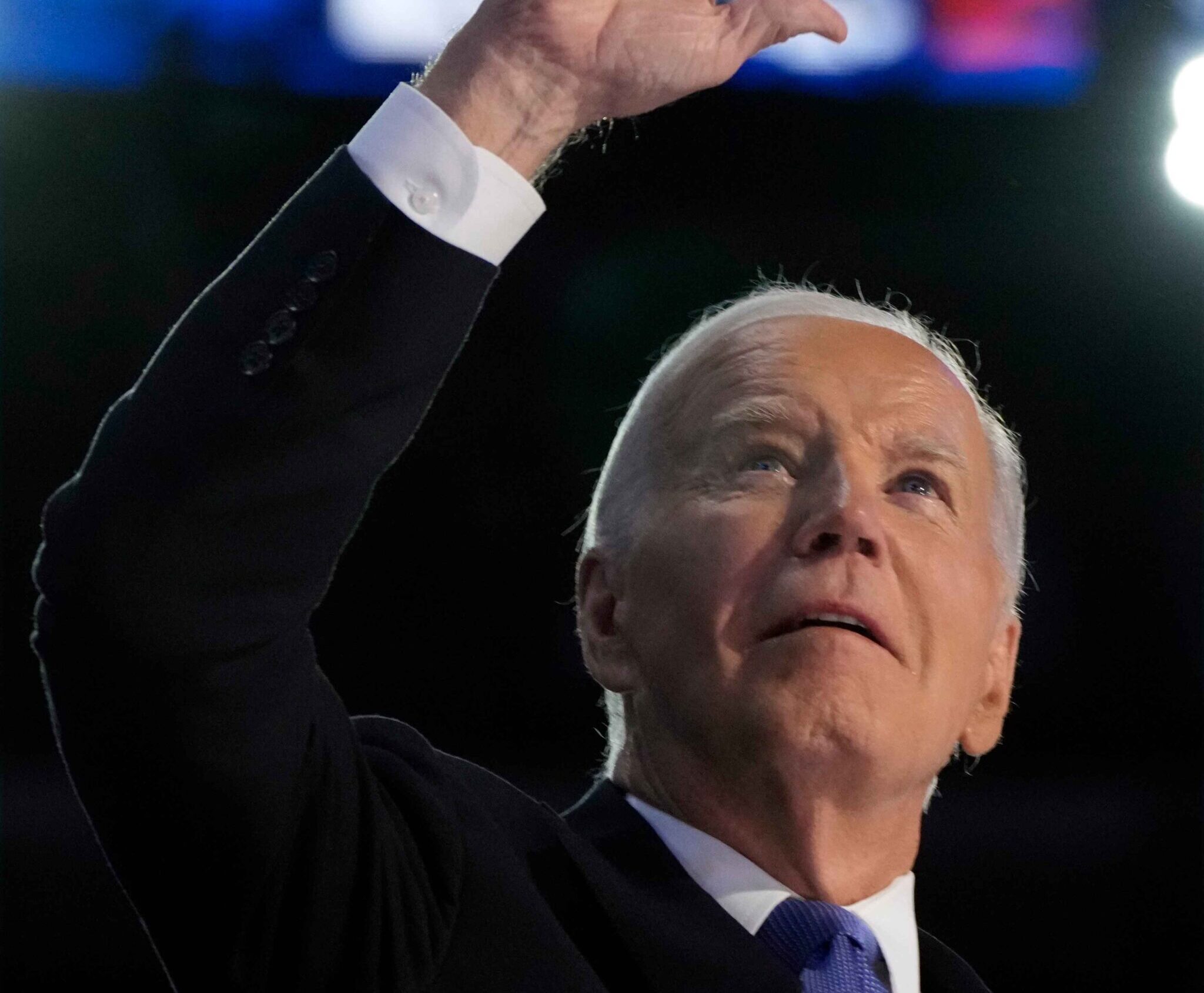Among the biggest stories of the summer, and indeed of the past year, was the news that wasn’t reported. This was, of course, the news that President Biden appeared to be more seriously diminished than he or his staff had disclosed.
What U.S. journalists did and didn’t report regarding Biden’s fitness before the disastrous June 27 debate needs close scrutiny, not to vilify the press but to derive lessons for the future and to reaffirm best practices – the mission at the heart of the NYU Ethics and Journalism Initiative.

Republican presidential candidate former President Donald Trump speaks during a presidential debate hosted by CNN with President Joe Biden, June 27, 2024, in Atlanta. AP Photo/Gerald Herbert.
Start with the premise that most journalists in mainstream publications are politically progressive and anti-Trump. Many journalists believe, based on Trump’s statements and actions, that the future of democracy, and perhaps of their own freedom to speak and report, depends on the outcome of the 2024 election. Yet reporters were aware these past months that Biden’s age, apparent physical fragility, and difficulty communicating raised urgent and painfully obvious questions: Was he capable anymore of governing effectively? Was he capable of running successfully? Was he capable of serving another term?
What should journalists have done?
The question goes to the heart of why we do journalism and thus to the heart of journalism ethics. It appears to have an easy answer – of course, you report as urgently and deeply as you can – but that’s not how much of the profession saw it for one long and pivotal year.
This is fundamentally an ethics issue rather than just one of strategy or competence because, at its core, ethical reporting is about honestly pursuing the facts that matter, regardless of where they lead. It’s about choosing to report important stories and explore compelling issues regardless of other considerations – in other words, sound story selection. It’s about rising above prevailing narratives to think independently about what the audience needs to know. It’s about humility, about not predicting the unpredictable or claiming to know more than we do. It’s about the hard work of finding facts rather than the easy out of trafficking in rumor and speculation.
As Nobel Peace Prize winner Maria Ressa succinctly put it: “Without facts, you can’t have truth.”
Most newsroom ethics codes focus primarily on story execution, on the principles of accuracy, transparency, and fairness. But principles of ethical story selection, while usually neglected, are just as important. The question of what we choose to cover or ignore precedes all others and speaks directly to our personal and professional values. Ultimately, are we trying to aid in the public’s understanding or to steer them to our set of beliefs? Do we aim to tease out the facts or to sidestep them for what we may perceive as a higher cause?
When it came to Biden’s fitness, most newsrooms, consciously or not, wrongly chose the latter path, though credit the Wall Street Journal with trying, at least late in the game, to pursue the story.
Excuses leap to mind, justifications not so much.
First off among the excuses: White House aides waived the press away from the story, leaked very little, and stayed united in their defensive crouch; it would have been hard work – exactly what the public hires us to do, incidentally — to have explored the question without inside help.
Second, White House reporters had very limited, very orchestrated access to the president and thus, as one told me, didn’t have much first-hand ability to assess Biden’s day-to-day endurance and acuity. The president seemed focused and alert in limited interactions, the reporter told me. And incessant deadline pressures and demand for daily campaign copy left little time for the laborious reporting that would have been necessary to penetrate the wall of obfuscation.
Third, and especially distressing, I heard prominent journalists admonish their peers to stay away from the story because it distracted the press and public from focusing primarily on what many viewed as a more important set of issues: Trump’s criminal indictments, his election denialism, his professed authoritarianism, and questions of his own mental fitness.If you don’t want to go wherever the facts take you, you generally won’t. (All of those Trump issues were, and are, coverage-worthy, of course, but not to the exclusion of accountability journalism about the current president.)
The result was the public’s belated “discovery” of Biden’s apparent decline during the June 27 debate and in his subsequent appearances, long after the primaries were over, long after Biden had secured the delegates necessary for nomination at this week’s convention, long after the Democrats could conduct an open process to decide on a nominee.
The lessons for journalists are simple but require repeating:
1. Chase the facts wherever they lead because that is our job. View stonewalling not as a deterrent to further reporting but as a spur to dig deeper.
2. Avoid speculation and rise about prevailing narratives – in other words think and report independently.
3. Report what you know and disclose what you don’t know and continue to report until you fill in as many of the holes as possible.
4. Never let your political biases – no matter how sure you are that they are truths not biases — cloud your judgment about what information you will share with the public. Share it all.
5. Empower your audiences to make their own decisions (not necessarily the decisions you would make) based on the most accurate information you can provide.
Donald Trump long ago declared war on the press, but we in the press always need to be at war with falsehood, and aligned with fact and truth, wherever they guide us. That’s how we generate trust in our profession and fulfill our responsibility to our audiences and to our democracy. That’s how, in the end, we behave ethically.
For more on the “summer of aging in American politics” and what ethical reporting on age & aging might look like, check out Kevin Lind’s recent Q&A with health reporter and Co-Director of the Journalists-in-Aging Fellowship Liz Seegert for the Columbia Journalism Review.
Another instance of faulty news-judgment this summer was the failure of many (not all) news editors to blast out coverage of the appalling carnage in Sudan, where a little-noticed civil war has caused the death by massacre of an estimated 15,000 civilians, countless rapes, the imminent threat of famine, and the displacement of millions. The killings continue, with new atrocities going nearly unnoticed in the U.S. every day. It is a global catastrophe of the highest order that few Americans could tell you anything about.
The choice to ignore Sudan isn’t just a question of resources or business model or news strategy: It’s a question of ethics and values.
Stephen J. Adler is director of the Ethics and Journalism Initiative at New York University, which works to produce stronger, more sure-footed journalists who are prepared to tackle the many complex ethical challenges facing journalists today and in the future. Through mentoring, workshops, training materials, public events and collaborations with newsrooms and other academic institutions, EJI aims to ensure that every journalist we reach learns to meet such challenges with skill, humanity, and intelligence. By advancing ethical practices in the profession, the Initiative works to foster trustworthy journalism that is vital to the preservation of truth telling and democracy. Adler has led national and global newsrooms for more than two decades, most recently as editor-in-chief of Reuters.
Have additional thoughts? Think we’re missing something? Email us to keep the conversation going.


